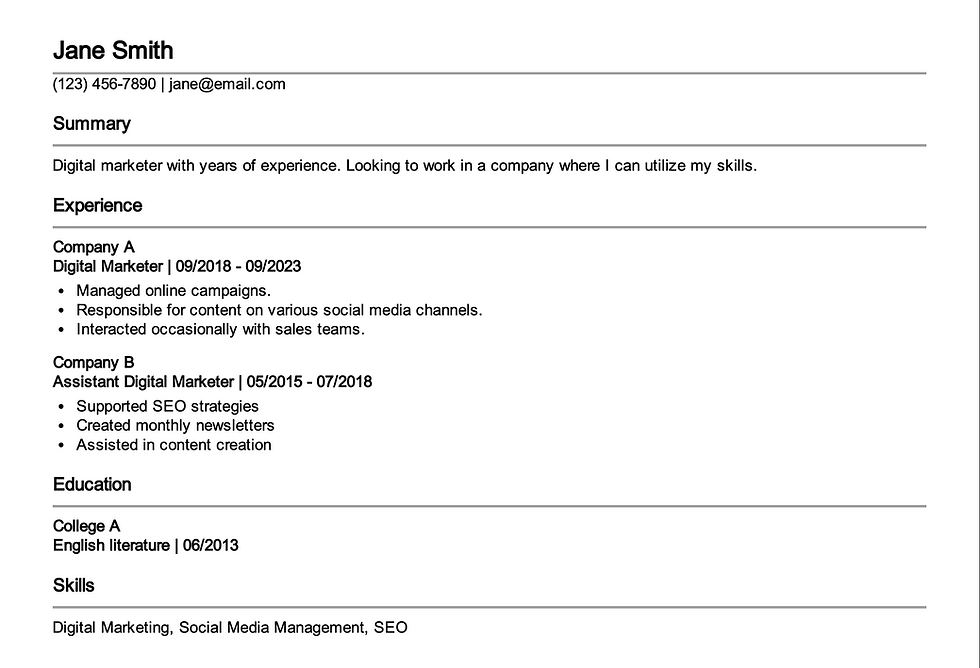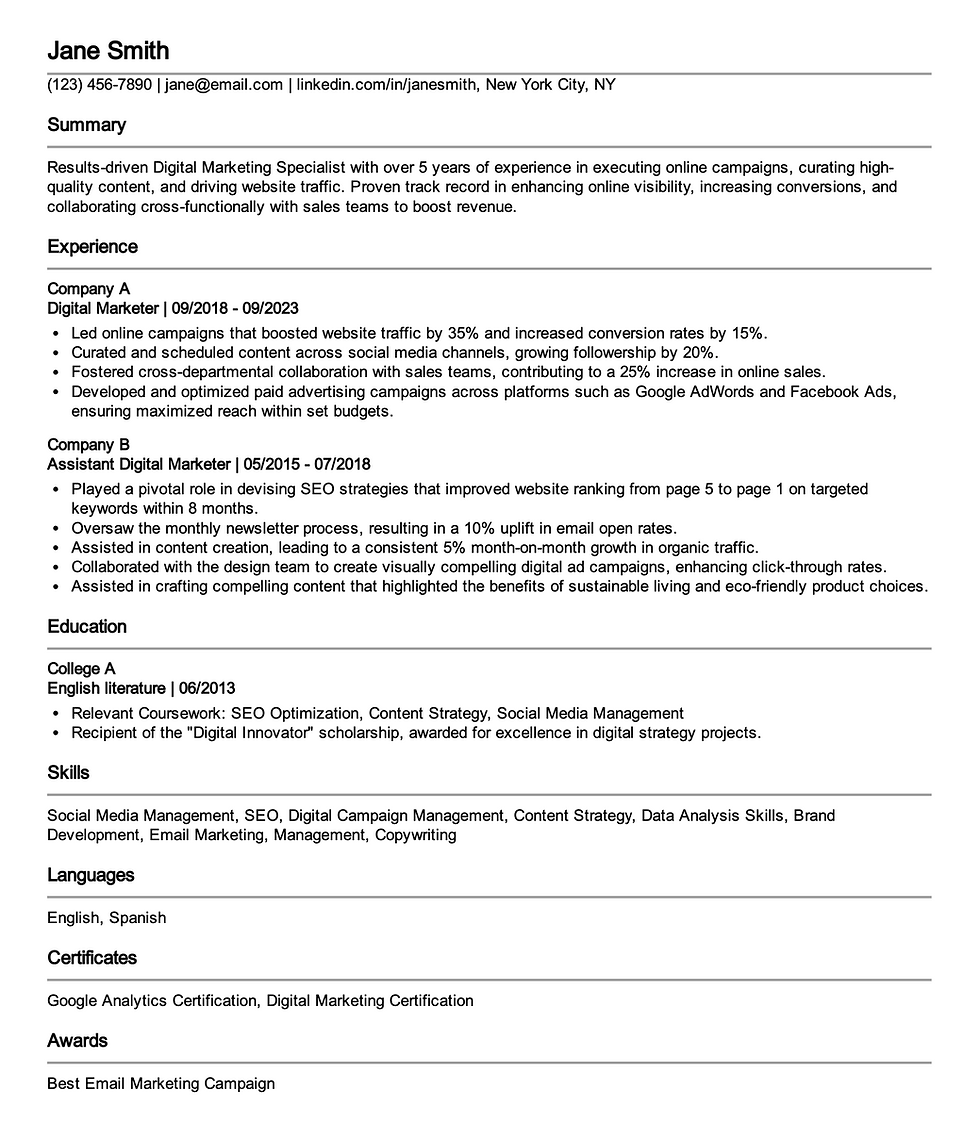Resume Tips for Candidates: What Hiring Managers Actually Want in 2025
- Laura Coe

- Aug 8, 2025
- 5 min read
Updated: Aug 22, 2025
If you’re like most job seekers, you've probably received plenty of outdated advice: stick to one page, sound ultra-formal, and send the same version to every employer. But recruiters' expectations have evolved.
Your resume isn't just a dry summary of your job history anymore; it’s your first chance to make a powerful impression, showcase your unique value, and stand out from hundreds of other applicants.

Debunking Common Resume Myths
Your Resume Must Be One Page
Reality check: If you've got extensive experience or multiple meaningful roles, don't cram your career onto one page just because someone said so. Aim for clarity and impact, whether that's one page or two.
Formal Language Makes You Look Professional
Forget complicated jargon and stiff wording. Write in a language that's authentically you, while still being professional.
Use the Same Resume for Every Job
Tailoring your resume for every job application is not a suggestion; it is a must. Employers can smell a generic resume from a mile away.
Include “References Available Upon Request”
Employers already know you'll provide references if they ask. Save space for showcasing your achievements.
Personal Interests are Irrelevant
While your resume shouldn't read like a personal diary, a few carefully chosen personal interests can highlight your soft skills or even showcase leadership abilities outside of a traditional work setting.
Essential Resume Tips for You to Stand Out
To truly impress hiring managers today, you don't need standard resume advice; you need targeted resume tips for that reflect what employers actually look for in 2025.
Highlight Transferable Skills:
Especially if you are transitioning industries, emphasize skills like communication, leadership, and problem-solving that matter across industries.
Use Measurable Results:
Replace vague phrases with specific metrics and accomplishments.
💡Example:"Boosted sales by 20%" instead of "Managed sales."
Include Relevant Online Courses:
Completed online certifications show employers you’re proactive and committed to learning.
Customize, customize, customize
Tailor your resume to highlight the experiences and skills most relevant to each position.
Use keywords from the job description to make your resume more ATS-friendly.
Highlight Soft Skills Clearly:
Highlight essential attributes like adaptability, teamwork, and problem-solving.
Use clear examples showing how you've applied these skills on the job.
Soft skills like these can often matter more to employers than technical abilities.
Link Your Professional Profiles:
Add your LinkedIn URL or professional website link, and make sure these are fully updated.
Write a Strong Summary Statement:
Open your resume with a brief, impactful summary tailored to your desired role. Make it immediately clear why you’re an ideal candidate.
Keep it Concise:
Generally, keep your resume within two pages max, focusing on achievements rather than lengthy job descriptions.
Common Resume Mistakes Job Seekers Should Avoid
Including Every Single Job You've Had:
Highlight the experiences most relevant to the position you're applying for.
Overusing Templates:
Templates are helpful, but personalize them thoroughly so your resume feels unique and stands out.
Including Personal Details:
Don't include age, marital status, or a photo unless explicitly required. Stick to professional, relevant details.
Listing Duties Without Achievements:
Instead of merely listing job duties, highlight what you accomplished in those roles.
Use specific examples and metrics to show how you made a difference.
Using Passive Language:
Avoid weak phrases like "was responsible for" or "duties included"; they make you sound passive.
Use strong action words like "managed," "developed," "increased," or "transformed" to clearly show your achievements.
Using an Unprofessional Email Address:
Make sure your email is professional and preferably based on your name.
Including References on Your Resume:
Keep references separate and ready if requested, but don't waste resume space stating this.
Mentioning Salary
Don’t include past salaries or salary expectations on your resume; that discussion belongs in the interview.
Listing salary details too soon can weaken your negotiating position or cause employers to pass on your application.
Using an Inconsistent Format
Keep your font, text size, and layout consistent throughout your resume.
Inconsistencies will make you look unprofessional and distract recruiters.
How to Tailor Your Resume for Each Job
Analyze and Mirror the Job Description:
Read the job posting closely to understand exactly what skills, experiences, and qualifications the employer wants. Highlight keywords and phrases they emphasize.
Match Your Skills and Qualifications:
Align your skills and experiences with the requirements of the job. Make a list of your qualifications that match those listed in the job description.
Use Keywords from the Job Description:
Use the keywords and phrases from the job description in your resume. This not only shows that you are a good fit but also helps your resume get past the ATS (Applicant Tracking Systems) that many companies use to screen resumes.[Read more about the ATS and how to move past]
Highlight Relevant Experience:
Focus on your professional experiences that are most relevant to the job you’re applying for. Use specific examples and quantifiable achievements to show how you've successfully handled similar responsibilities in the past.
Showcase Transferable Skills:
If you’re changing industries or roles, highlight transferable skills that would be beneficial in the position you are applying for. Skills like leadership, communication, problem-solving, and project management are valuable in many different fields.
Adjust Your Professional Summary:
Rewrite your opening statement to match each role, quickly showing why you're the perfect candidate
Prioritize Information Strategically:
Organize your resume so the most relevant information is prominent. Typically, the top third of your resume is what the hiring manager will see first, so make sure it makes a strong impression.
Include a Customized Cover Letter:
Expand on your fit for the role with a personalized cover letter tailored to each position.
Proofread for Tailoring Mistakes:
Check your resume carefully—not just for typos or grammar mistakes, but also to make sure every example and achievement directly relates to the job you want.
Making Your Resume Visually Appealing and Readable
Use a professional, clear font like Times New Roman, Arial, or Calibri.
Maintain consistent formatting and clear layout.
Use headings and bullet points for readability.
Add ample white space to avoid clutter and improve scanning.
Highlight key information using bold or italics sparingly.
Avoid excessive colors or graphics, keep it clean and professional.
If printing your resume, choose high-quality paper and printing.
Ready for a Resume Upgrade?
If you’re serious about landing your dream job, your resume shouldn’t hold you back. Our expert team at HC-Resource specializes in resume writing, LinkedIn optimization, interview coaching, and career strategy.
Here's an example of what Jane's ineffective resume might look like:

The Summary is generic and doesn't clearly state what she brings to the table.
Under Professional Experience, there's a lack of specificity, making it hard to understand Jane's actual contributions or achievements.
The Skills section is basic and lacks depth or specialization.
Hereʼs how Janeʼs resume should look:

Provides a Summary that clearly states her strengths and value proposition.
Lists relevant education with some coursework details.
Contains quantifiable achievements in the Professional Experience section.
Includes a comprehensive Skills section, demonstrating her technical competencies.
Adds a Certifications section, which can be crucial in the digital marketing field.*
Notes language proficiencies under Languages, which can be an added advantage in global companies or for content targeting diverse audiences.


